Category: Uncategorized
Summary
This study identifies eight attributes of female leadership that has contributed to the success of the Pedagogical Leadership in Africa (PedaL) partnership, one of three SPHEIR projects addressing pedagogical reform. PedaL is a partnership between higher education institutes in Ghana, Kenya, Tanzania, Uganda and the UK. Academics from these partner institutions have trained and established a network of teachers in African universities to transform graduate education by embedding innovative pedagogy within graduate social science programmes. The partnership is led by Dr Beatrice Muganda of Partnership for African Social and Governance Research (PASGR) in Nairobi, Kenya. The PedaL approach represents a systemic shift from dominant traditional teaching models to more participatory, student-centred approaches. It is gender-sensitive and subject content integrates an analytical lens on power and inequality. Dr Muganda’s leadership approach reframes what it takes to be a successful leader, to manoeuvre skillfully and to bring power on side, so as to expand opportunities for students to contribute to inclusive social and economic development.
The Partnership for African Social and Governance Research (PASGR) is an independent, non-partisan Pan-African not-for-profit organisation established in 2011 and located in Nairobi, Kenya. PASGR’s vision is a ‘vibrant African social science community addressing the continent’s public policy issues. PASGR seeks excellence in social science research for public policy. In partnership with individual academics and researchers, higher education institutions, research think tanks, civil society organisations, business and policy communities both in the region and internationally. PASGR supports the production and dissemination of policy-relevant research; designs and delivers suites of short professional development courses for researchers and policy actors, and facilitates the development of collaborative higher education programmes. To learn more about PASGR please click here.
Background
PASGR with financial support from the Carnegie Corporation of New York seeks to explore means of strengthening equitable access to quality higher education (HE) in a pandemic environment in Kenya. This will be achieved through a sequence of activities that entail synthesizing emerging evidence, conducting supplementary small scale studies and examining policies in response to the wide-scale disruption on HE. A broad spectrum of higher education stakeholders will be convened to deliberate on the evidence and supported to use it in their policy and programme interventions. PASGR will leverage its Utafiti Sera model (Swahili phrase for research-policy) to build strategic alliances with various HE interest groups, public and private sector, communities, and policy actors with a genuine interest to shape public policy and influence the design of appropriate interventions and programmes that respond to disruptions of learning during pandemics such as COVID-19. Utafiti Sera is expressed in the form of “policy-communities” houses, which are spaces, places and processes for evidence-informed and guided policy engagement. Utafiti Sera houses set relevant agendas, generate debates and awareness, and provide comparative evidence for formulating and debating programme design, policies, or administrative and other forms of civic action. The approach intentionally creates safe spaces where researchers, policymakers and citizens obtain a better understanding of policy processes, are more aware and involved in the conceptualization, the conduct of research, and thus constitute a co-construction of the evidence. This is consistent with PASGR’s r research agenda that is embedded in African governance as well as changing policy priorities consistent with the 18 “social policy issues” described under the African Union’s (AU) Social Policy Framework.
Education is a critical social policy issue that is attracting global attention since the onset of the COVID-19 pandemic which led to the closure of universities, thus, disrupting education programmes. The adverse consequences on students, lecturers and university administrators, as well as on the achievement of specific university outputs such as graduation rates as well as research and knowledge production require further investigation. This project will therefore support the generation, synthesis, engagement and use of evidence on three thematic areas: (i) resourcing for access, equity and quality education during and post-COVID-19; (ii) opportunities for Public-Private Partnerships in strengthening access to Higher education; and, (iii) impact of the pandemic on postgraduate training and research and the future of emerging academics. The evidence generated will be used to engage key stakeholders and policy actors to influence policy that promotes equitable access to quality higher education in a pandemic environment. There are limited studies on what the universities could do to prepare for a recovery phase and to address the quality as well as the impact of online learning on excluded groups. This project seeks to address these gaps through a structured evidence generation and synthesis process and by stimulating the use of the evidence to inform and guide policy and programme options for strengthening access to higher education during and beyond the COVID-19 pandemic. The project will be based in Kenya with a focus on Kenya’s higher education system and will run for two years. A cross-continental audience will be invited to participate in the policy forums to share their experiences and debate the research evidence. It is expected that project outcomes, that is, policy and programmatic interventions that strengthen equitable access to quality higher education during and post-COVID will be replicable in higher education systems across the continent and inspire stakeholders to re-imagine higher education in a post-pandemic era.
About Utafiti Sera
Utafiti Sera, supports, contributes to building and enhances a community of researchers and policy actors working together to ensure that appropriate and negotiated policy actions and uptake occur either through programmes, legislations, policies or administrative and other forms of civic actions around issues for which research has provided evidence or for which a synthesis of available evidence has been made. Utafiti Sera is a combination of many things that ensure and enhance policy outcomes. It is a ‘process’, place’, ‘forum’, ‘platform’, or a ‘vehicle’ for transforming research evidence-based knowledge for policy uptake. As a ‘process’ Utafiti Sera involves sequences of activities that enable the building of a community of interests and practice from where existing and new ideas and evidence flow from members of the community resulting in collective action and interventions to improve policy design and implementation. As a ‘place’, Utafiti Sera provides a space for key stakeholders with interest, power, capacity and motivation to act in diverse ways to ensure that research evidence becomes available and is used to make informed policy decisions and practices. As a ‘forum’, it provides a non-partisan platform for knowledge engagement, ‘outreach’ and ‘in-reach’ by different members of the community irrespective of theoretical and ideological differences, in order to build bridges and work together to establish common ground for the pursuit of agreed-upon goals. And as a ‘vehicle’, Utafiti Sera constitutes motor and pathways, transmission belts or/and channels for shared knowledge (common areas on which there are agreements and consensus), and experiences to enhance policy uptake. In short, Utafiti Sera is a phenomenon whose form is determined by the specific conjuncture or/and context in which it is expressed or put in place. It has no permanent form except that of community formation or action of a collective of researchers and policy actors in the pursuit of policy uptake. Utafiti Sera at national, local and regional levels is an innovative mechanism to inform and positively advocate, proffer and contribute to appropriate and relevant policies and programmes that address inclusive development and the wellbeing of citizens through research evidence for policy. To learn more on Utafiti Sera please click here .
PASGR invites Expressions of Interest from interested organizations to host the Utafiti Sera on Strengthening Equitable Access to Quality Higher Education in the Pandemic Environment in Kenya
Activities the Host Organisation will deliver
The host organisation, in close collaboration with PASGR, will undertake a series of activities to inform and influence policies that address challenges facing higher education provision and its consequences during the COVID-19 pandemic in Kenya. Apart from the activities stated below, the host organisation will demonstrate, encourage and facilitate the ownership of the research-policy community along with other Kenyan stakeholders and institutions active in the field. The activities envisaged to be implemented in the 2021 –2022 period includes:
- Mapping of key stakeholders in Higher Education in Kenya.
- Synthesis of Existing Studies on the three thematic areas selected for the study in Kenya.
- Organising stakeholder forums, high-level meetings and a final conference in Kenya involving all the HE stakeholders engaged in the project;
- Facilitating and enabling an active community of practice around Kenya’s Higher Education issues;
- Identifying and involving potential champions of Higher Education as part of the Utafiti Sera house;
- Communication, reporting and media engagement of research evidence and materials developed.
Eligibility Criteria:
- Research institutions, Civil Society Organisations (CSO’s) and Non-Governmental Organizations (NGOs) with a strong focus on Higher education, and domiciled in Kenya. This may include institutions and organisations which finance or conduct research, or synthesize research and ensure policy uptake and use of research-based knowledge to promote public policy or/ and advocate for public policy e.g. research institutes, think tanks, civil society advocacy organisations with County-wide and /or national reach, research councils and research consortia. The applicant must be legally registered. Commercial actors and individuals cannot apply.
- The applicant will have experience in developing technical research products such as writing working papers, literature synthesis, stakeholder mapping, policy briefs, infographics, video documentaries, and also write reports. PASGR does not encourage ‘copy and paste’ – we are deliberate about simple but potent language to fit donor requirements and the policy audience.
- The applicant must demonstrate a capacity for (i) education research (ii) financial management of this work (iii) convening of stakeholders in the field of Education.
- The applicant must have experience in convening a broad array of stakeholders including government agencies and ministries, civil society, academia, development partners, the private sector, and other stakeholders relevant to the thematic areas.
- The applicant must be conversant with developing content to engage the media, including the newspaper, radio, television as well as social media engagement and blogs.
Submission of EOI
Interested organisations are required to submit their EOI no later than 10/03/2021, 0000hrs Nairobi time by e-mail ONLY to info@pasgr.org Please indicate in the e-mail subject field: – EOI/2021/PDT/US/1 – Name of the Organisation.
The EOI should provide the following information:
- Organisational status and profile.
- Evidence of experience that demonstrates capacity and competence in hosting and organising similar programmes.
- Links to research or reports on the broad thematic area of Higher Education.
- In a separate one-pager, describe in some detail, the unique and innovative approach(es) the organisation would use to deliver the ‘Utafiti Sera’ in the stated area, including how to achieve sustainability for this particular house.
- 3-page CVs of the head of the organization or association and two members of the management team should be provided. Gender and inclusivity in the team would be an added advantage.
- Any other information that can help PASGR judge the organisation’s suitability for hosting the programme.
*Please note that PASGR will invite a potential host organisation for discussions before making the final decision.
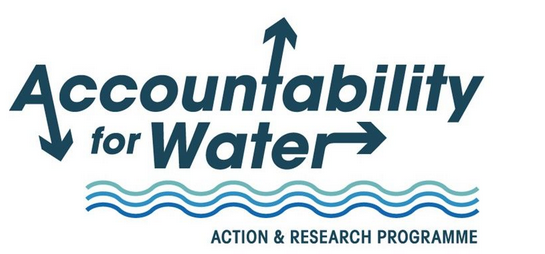
Deadline: Midnight EAT, Sunday 29th November, 2020
Please submit your CV and 1-side cover letter to apply, and/or share this with colleagues who may be interested.
Who can apply to the programme?
We are looking for mid-career leaders in the water security or WASH sector – whether working for part of the government, an NGO, private sector, research institute or other. Focus country are Tanzania, Ethiopia and Kenya, but applications from elsewhere in Africa are also welcome.
The training will entail 2 hours online seminars between 11am and 1pm EAT once per week for 9 weeks, plus 1-2 hours additional materials to be completed at any other time each week.
The training is free but space is limited – participants will be selected based on applications that show strong motivation to work on accountability, relevant skills and experience, and potential to proceed to the Professional Research Fellowship programme.
The masterclass will build knowledge and understanding of accountability in the water sector, and research methods. Completion will be recognised by a certificate of attainment.
The learning will be structured to support the preparation of a research proposal to submit for the Professional Research Fellow (PRF) grant, so if you think you might want to submit a proposal for this programme you are strongly encouraged to apply for the training. The PRF research grant is for your employer to support you to complete research (supported by the programme with training, mentoring and research costs) within your scope of work, during your normal hours of employment. (Approximately 90 days over 18 months). It will therefore be important that you will be supported by your employer to proceed with the PRF part of the programme. Find out more about the programme here: www.accountabilityforwater.org
1-side cover letters should include a very brief summary of:
- Your current role and how it relates to accountability in water
- Whether you have discussed the opportunity within your organisation and have support to engage during the working day / develop a research proposal
- What research question or area (related to accountability for water) you think is important and would be interested to investigate.
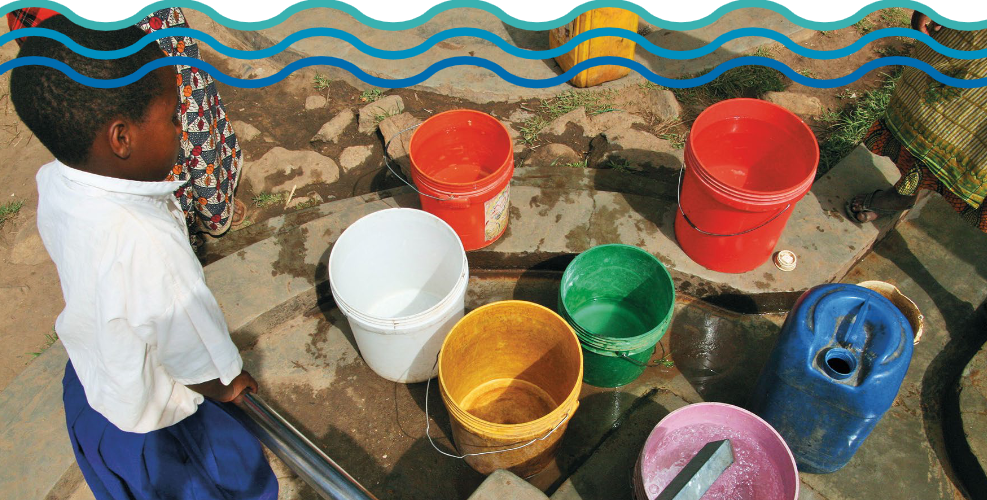
Click on Briefing Note here
Contact person: Lauren Wesonga- lwesonga@pasgr.org
Accountability for Water is a new programme of action & research to improve water governance & water service delivery. Too often good policies, wise laws and promising programmes have failed because of weak accountability.
To harness the potential of stronger accountability we need to know ‘what works and why?’ in different water management contexts.
We invite you to join us and support our three goals for water security:
- Knowledge generation: Sector leaders supported to do high-value research
- Outreach and uptake: Sharing findings through meetings, publications and online
- Ensuring legacy: Developing strategies, support networks and implementation plans
Become a Host Organisation
Any organisation with an interest in accountability can be a host organisation-government agencies, utilities, civil society or researchers. With a PRF research grant you can support a member of your team to complete research on your priority accountability issue.
Become a Professional Research Fellow
Fellows will be professionals who sit within a host organisation who are capable of carrying out original research, with training & mentoring support from a wide range of organisations and experts including leading researchers. Learning Partners are welcome to join. Contact us to receive regular updates and share your learning with us.
Our 9-week remote-learning masterclass on Accountability for Water begins on 16th November 2020. Participants will receive a certificate of attendance and coaching to develop a Research Fellowship Proposal for an 18 month research grant. To register interest and find out more, and to register for our launch event on 5th November 2020 (online -2pm EAT):timbrewer@waterwitness.org
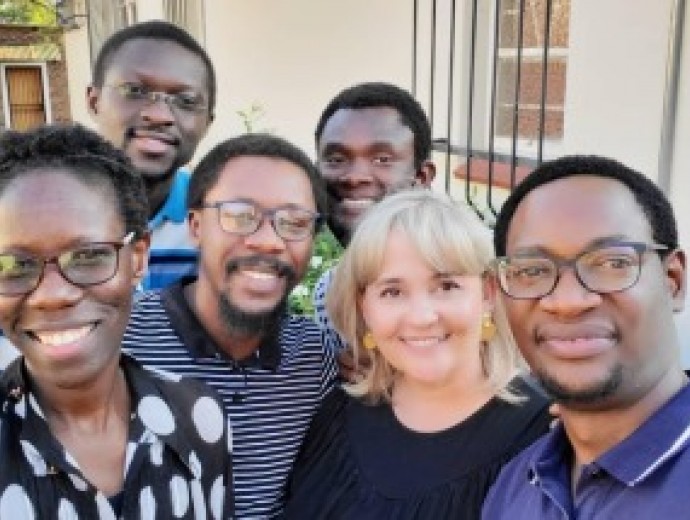
The University of Pretoria’s School of Public Management and Administration (SPMA) will offer a new PhD programme in Public Policy, and prospective students will be able to apply for it in 2021.
This development comes as a result of engagements between the SPMA and the Partnership for African Social and Governance Research (PASGR) in 2019, when UP staff met with Dr Beatrice Muganda, Dr Pauline Ngimwa and Executive Director Professor Tade Aina from PASGR.
“The University has recently signed a Memorandum of Agreement with PASGR and we believe this will just strengthen the very good relationship the SPMA has formed with PASGR over the last year,” says Prof Natasja Holtzhausen, SPMA PhD coordinator.
One of the discussion points was a PhD programme with a strong policy focus. With the support of the Faculty of Economic and Management Sciences and University management, Prof Holtzhausen and SPMA colleagues wrote a proposal that was submitted to all the relevant university committees to obtain permission for a degree that specialises in public policy. Top prospective students from across the continent were targeted. The Carnegie Foundation made 15 full scholarships available to fund exceptional PhD students. These 15 scholarships were shared among the three universities that were piloting the PhD, these being the University of Ibadan in Nigeria, the University of Nairobi in Kenya, and the University of Pretoria.
The first students, mainly from Uganda and Nigeria, enrolled at UP in January 2020, but under the PhD Public Administration and Management programme. The PhD degree in Public Policy has since been approved by Senate and as of 2021, prospective students will be able to apply for this specific degree.
This has been reposted from https://www.up.ac.za/school-of-public-management-and-administration/news/post_2929457-spma-to-offer-new-phd-in-public-policy
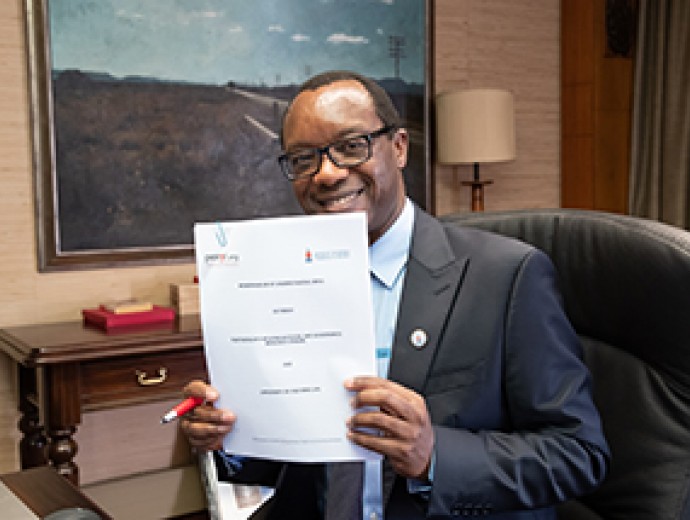
University of Pretoria (UP) Vice-Chancellor and Principal Professor Tawana Kupe and Partnership for African Social and Governance Research (PASGR) Executive Director Professor Tade Aina formalised the strategic partnership between the two institutions during a virtual signing ceremony of a memorandum of understanding (MoU) on Monday, 21 September.
PASGR is a pan-African non-profit organisation established in 2011 and located in Nairobi, Kenya, with engagements in over 25 African countries focused on enhancing research excellence in governance and public policy for society’s overall well-being. The strategic partnership between UP and PASGR will be anchored by the collaborative Master’s Programme in Research and Public Policy and the Doctoral Programme in Public Policy offered together with the University of Ibadan and University of Nairobi. Collaboration will also focus on research and policy training for early and mid-career researchers, and collaborative research grants on important policy issues in Africa.
The partnership with PASGR is very much aligned to UP’s strategic goal to become the leading African-global university. This strategic goal seeks to develop a globally competitive and recognised research institution responsive to societal challenges, particularly in Africa. UP’s four transdisciplinary platforms, (i) the Future Africa Campus and Institute, (ii) Javett Art Centre, (iii) Engineering 4.0, and Innovation Africa@UP will play a leading role in this regard. For the UP-PASGR collaboration, Future Africa will be an instrumental science-policy platform for hosting transdisciplinary teams of researchers and practitioners, including policymakers from the continent and the rest of the world in the co-creation of knowledge to address complex governance and public policy challenges facing Africa.
During the virtual ceremony, Prof Kupe noted that “this MoU provides a visible manifestation of agreed strategic collaboration and a shared commitment to the leveraging of our collective intellectual capital, expertise, resources, and capacities in the advancement of our well-aligned visions and strategic priorities”.
PASGR Executive Director Prof Aina added that the MoU “is also a reinforcement for building the next generation of public policy researchers and leaders in Africa”.
This has been reposted from https://www.up.ac.za/news/post_2924288-up-formalises-strategic-alliance-with-the-partnership-for-african-social-and-governance-research-pasgr
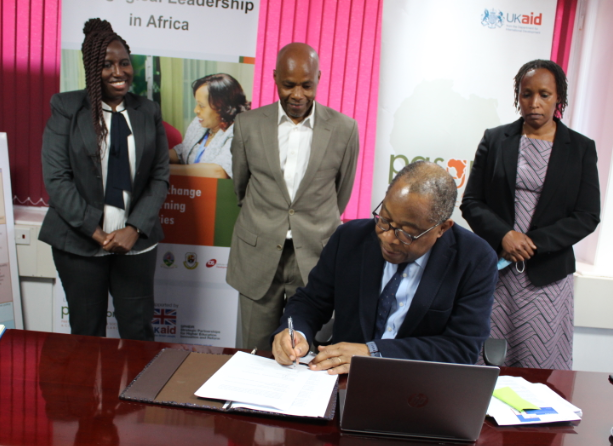
A new partnership between South Africa’s University of Pretoria and the Kenya-headquartered Partnership for African Social Governance Research (PASGR) will boost capacity-building, especially for postgraduate students and early- to mid-career researchers in Africa.
The collaboration, formalised this week (21 September) during a virtual meeting of senior staff from the two institutions and other higher education experts from Africa, will be led by the University of Pretoria (UP) and PASGR and implemented in collaboration with Nigeria’s University of Ibadan and Kenya’s University of Nairobi.
The partnership will be anchored under five flagship programmes of PASGR, including the collaborative doctoral programme in public policy to be offered by UP, University of Ibadan and University of Nairobi. For this programme, PASGR has received seed funding from the Carnegie Corporation of New York to support 15 fellows and pilot the doctoral programme at the three universities.
Other programmes include a collaborative masters programme in research and public policy; a pedagogical leadership in Africa programme; a research and policy training programme for early- to mid-career researchers; and collaborative research grants relating to important public policy issues in Africa.
According to a statement about the partnership, it will also focus on strengthening public policy through other initiatives such as the research partnership programme between UK Research and Innovation (UKRI) and the African Research Universities Alliance’s (ARUA) Food Systems Research Networks for Africa project which seeks to “strengthen food systems research capabilities and the translation of evidence into implementable policy solutions and practical interventions” in support of the United Nations’ Agenda 2030 on Sustainable Development.
“Partnerships are key to how higher education should be reimagined post COVID-19,” said UP Vice-Chancellor Professor Tawana Kupe.
“This collaboration will establish a model for partnership between universities and non-profit organisations,” said Kupe.
PASGR Executive Director Professor Tade Aina described the partnership as another “landmark event” in building excellence in social sciences, the arts and humanities.
“This is an intellectual and academic relationship that is central to Africa and will bring out the innovation, creativity and work needed to build the continent,” said Aina.
He said despite the challenges facing African universities and countries, the partnership should pave the way for further collaborations aimed at building better universities.
UP Director of Institutional Planning Dr Gerald Ouma said collaborations had become a necessity and this was amplified by COVID-19. He said the continent would need more international networks of collaboration to support young and upcoming academics and early- to mid-career researchers.
Dr Beatrice Muganda, Director of Higher Education Programme at PASGR, said the partnership would help students across Africa to develop competencies for shaping public policy across a wide spectrum of sectors, from social issues such as identity crises, to migration, security, food systems and public health.
She said it would help students and academics from Africa to benefit from the knowledge and skills of the host universities.
Kupe described the partnership as a South-South collaboration that will help develop knowledge that can be translated into programmes solving critical issues of development in Africa.
Professor Karuti Kanyinga, a PASGR board member, said it would give international visibility to African intellectual products and help to drive an agenda that is anchored on African ideals and help to bridge interdisciplinary gaps.
Kanyinga expressed concern that many countries in Africa still neglect research and evidence in policy-making, a culture the partnership will endeavour to change, he said. “This partnership will help lobby African governments to use evidence in decision-making. The more we have such partnerships, the greater the voice of African scholars in policy-making.”
This has been reposted from https://www.universityworldnews.com/post.php?story=2020092313380718
The PedaL project is a platform to revolutionize the teaching narrative by updating the pedagogical skills of African university teachers. The PedaL integrated model comprises six major components, namely, pedagogical strategies, educational foundations, technology-enhanced teaching and learning, curriculum and learning design, pedagogical leadership practice, and assessment. PASGR targets creating a vibrant African social science community that addresses the continent’s public policy issues. Read more
As online and blended teaching and learning become part of the new normal, the need for specialist training of academic staff is being realised.
Last month, a three-week course designed by the Partnership for African Social and Governance Research (PASGR) and intended to teach lecturers how to design, prepare and assess online courses, attracted 100 lecturers from universities in Botswana, Ghana, Kenya, Nigeria, South Africa, and Uganda.
The pilot training was part of the Partnership for Pedagogical Leadership in Africa (PedaL) programme. PedaL is one of the nine partnerships of the United Kingdom’s Strategic Partnerships for Higher Education Innovation and Reforms, aiming to catalyse systemic change in teaching and learning in African universities.
The initiative has trained over 1,100 academics from 60 African universities and is implemented by PASGR in partnership with the African Research Universities Alliance, Nigeria’s University of Ibadan, University of Ghana, Uganda Martyrs University, Tanzania’s University of Dar es Salaam and Egerton University in Kenya.
Students at the centre
Audited by the Commonwealth of Learning, INASP (International Network for the Availability of Scientific Publications), and the Association of Commonwealth Universities, the online course provided a platform for academics to share knowledge and ideas on how to improve pedagogy and ensure that students are at the centre of learning through online or blended learning.
The facilitators of the pilot training used a range of teaching tools such as case studies, simulations, concept maps, role plays, and authentic tasks to spur experience sharing, critical thinking, problem-solving, and collaboration among participants.
Dr. Beatrice Muganda, the director of the Higher Education Programme at PASGR, said the design of the course enabled lecturers and facilitators to work collaboratively.
“The programme to deliver courses online must be exciting for students in the way they are structured so as to meet the desired learning outcomes. The strength of PedaL is that everything we do is transferable to the classroom, whether physical or virtual,” Muganda told University World News.
Muganda said that the training would bring about the “transformation that we hope translates into learning”. However, she said the lecturers will still have a month to access the online resources and consult the course facilitators so as to increase the depth of learning.
Technology as facilitator
Contrary to some fears, online teaching requires more lecturer engagement than before, she said, referring to concerns that technology could replace teachers. “Technology won’t do everything for us but may make our work easier, even in terms of evaluating students,” Muganda said.
She added that even after the official end of the online pilot training programme, academics continued with self-paced learning, uploading courses at 3 am. This, she said, implies that the continent is creating a new cadre of academics who spend much of their time planning for their students.
“Before the coronavirus pandemic, everybody had something to say about online and blended teaching but no institutions put in place the machinery for online learning,” said Professor Tade Aina, the Executive Director of PASGR.
Aina, who formerly was the programme director of the Higher Education and Libraries in Africa Program for the Carnegie Corporation of New York, said PASGR was already considering online and blended learning, especially for the PedaL programme, before the pandemic hit.
Increased access to pedagogical transformation training
“We were keen on this so as to increase access to our pedagogical transformation training in the continent … This implies that physical training could not be sufficient to reach as many academics as possible,” Aina told University World News.
Aina urged academics to ensure that technology-enhanced learning was simple, engaging, transferable, and comprehensive. He said the positive responses from participants to the pilot training show that online and blended learning is inevitable in Africa, despite challenges such as blackouts and unreliable internet coverage.
“The most important thing is getting ways to support lecturers and students for online learning. It’s work in progress; we shall have errors and hitches but we will finally get there,” Aina said.
Fourth industrial revolution
He challenged African universities to prepare for a culture of online delivery and assessment, arguing that the pandemic was hastening Africa into the fourth industrial revolution.
“There will be a high dependence on machine learning and artificial intelligence. University leadership should be preparing for this by completely reforming our research and development so that we are not just consumers but also innovators,” said Aina.
Khaemba Ongeti, associate professor in the department of curriculum and instruction at Moi University’s School of Education in Kenya, said the work of the lecturer had expanded with the emphasis on remote teaching and learning.
“Online teaching will also require lecturers to constantly review what they are doing to ensure that students’ interest in learning is kept high,” said Ongeti, adding that supporting learners will be critical to achieving desired learning outcomes.
Participants said the course was an eye-opener with regard to revealing the tools available online to help them.
“I join all participants in expressing my profound gratitude to PASGR and her partners for this opportunity to acquire 21st-century skills,” said Dr. Ndidi Ofole, one of the trainees and a senior lecturer from the University of Ibadan. Her colleague, Sella Terrie Jwan from Moi University, said the training was taxing but fulfilling, leaving her empowered to move with speed and start practicing online teaching.
This has reposted from https://www.universityworldnews.com/post.php?story=2020070716115125